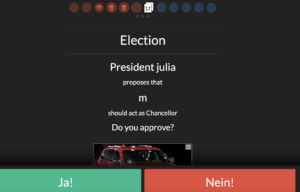Secret Hitler, created by Mike Boxleiter, Tommy Maranges, and Max Temkin, serves as a case study in how a game can deeply integrate social deduction into its mechanics to create a compelling and interactive experience. I’ve never played before but it seemed similar to Mafia but even more complex, and fun because of this complexity. Aimed at players aged 13 and up (info found online), this game places a strong emphasis on strategy, deception, and political intrigue. Friends and I played online but I know the board game version is also quite popular. Designed for groups ranging from 5 to 10 players, Secret Hitler is a complex mix of deduction and strategy that had my friends and I really intrigued.
The essence of Secret Hitler lies in its ability to foster an environment of suspicion and intrigue within its seemingly basic gameplay structure. Players are divided into two teams: liberals and fascists, with one player secretly assuming the role of Hitler. The liberals win by enacting five liberal policies or assassinating Hitler, whereas the fascists aim to pass six fascist policies or elect Hitler as chancellor after three fascist policies have been enacted. This setup is central to the game’s engagement, compelling us players to analyze and manipulate information and behavior to achieve our respective team’s objectives.
What truly distinguishes Secret Hitler, in my opinion, from other games in its genre, such as Mafia, is its incorporation of political elements and the dynamic process of electing players to positions of power. This strategic layer necessitates not just behavior analysis but also negotiation and alliance formation, which adds a level of complexity I really quite enjoyed, setting it apart from games where decisions might be more arbitrary/random or based solely on accusations, which is less fun and less intellectual.
The policy deck, a combo of liberal and fascist policies, introduces an element of unpredictability that can disrupt most strategic plans, which I experienced while playing. This randomness calls for a high level of adaptability among players, as we often find ourselves in situations where we have to enact policies opposite to our team’s goals, which creates an atmosphere full of suspicion and sometimes grave accusations.
Despite its strengths, Secret Hitler has areas for potential improvement, especially based on the formal elements we discussed in class. One aspect that could be addressed is the potential for more dominant personalities to overshadow quieter players, affecting the game’s outcome, although sometimes the most effective players stay quiet. Introducing mechanics that encourage more balanced participation, such as timed discussion periods could improve the gameplay experience for all involved.
The MDA framework helps me appreciate how the game’s mechanics facilitate a dynamic environment that brings about a deeply emotional and engaging experience focused on suspicion and true strategy–Secret Hitler is truly quite intellectual in this way. The game’s careful design, from its roles and rules to its objectives, exemplifies how formal elements can be leveraged to create a rich narrative element that mirrors the complexities of real-life political maneuvering. This sets Secret Hitler apart amongst strategy games. In conclusion, Secret Hitler stands out as a profound example of how social deduction can be seamlessly integrated with game mechanics to bring about engagement, and challenge players intellectually and socially, making a memorable experience overall. Its design reflects a thoughtful balance between randomness and strategy, making it a leader in the deduction game genre. The game’s ability to simulate the tension and uncertainty of politics, and really immerse players in the world of Secret Hitler, coupled with the critical role of player interaction makes it a wonderful study in how games can invoke strong emotion within each of us while playing.
This image is from when friends and I were playing Secret Hitler–while the game itself lacks much of a visual element, having something like an online tool or a board game element to keep track of things, unlike Mafia, for example, certainly makes gameplay smoother.




